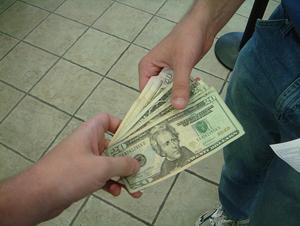Grassroots savings plan helps many in tough times
CC: quaziefoto/Flickr
In the U.S., President Obama has tried to encourage investors to buy more stocks. But you could forgive skittish investors for staying on the sidelines. So if you’re looking for a safer place to park your money, consider a susu. The World’s Jason Margolis reports.
Before we learn what a susu is, let’s hear what you can do with a susu.
"I did susus to raise my daughter. You know when it’s time for camp? So you get in a susu, there’s the camp fee," says Sabra Richardson.
Francis Gonzales adds, "I purchased a new car. It helped me with the down payment for a new car."
Both Richardson and Gonzales live in Brooklyn. They’re both from the Caribbean, and they both use susus. So what is a susu? It’s basically an informal investing club, as Sabra Richardson explains.
"It started long ago in the Caribbean. It’s prior to our being able to really go into the banks and put our monies in. So it’s a matter of us just starting our own means of capital," says Richardson
This is how it works. Let’s take a hypothetical susu: you, me, and say eight of our friends. Every week, the ten of us each put $100 dollars into the susu. So the pot each week is $1000. The treasurer then decides who needs the money most urgently. Let’s say Francis Gonzales needs to pay some hospital bills. He gets the $1,000 right away. So for him, adds Gonzales, "It’s like a loan, because over the course of the year, I will be paying back $100."
Now, Gonzalez has his money; he’s paid his hospital bill. But remember he still has to put in $100 every week for the rest of us in the susu. Sabra Richardson doesn’t mind getting paid last. For her, the susu is a way to impose discipline, putting aside money for future expenses.
"It may be planning for a vacation. It may, you know, be your child’s tuition."
Both Gonzales and Richardson do have access to banks. Gonzales moved to New York from Trinidad and Tobago 35 years ago. Richardson is a second generation American. She was actually a banker. So why the susu? I peppered Richardson with questions. Why give up interest she could earn in a bank? Doesn’t getting paid back last in the susu put her at a disadvantage?
"It’s a cultural thing. You could just say it’s just like a communal kind of thing. It’s almost like a – you know, now that you’re asking me these questions, we never thought about it. "
Susus have been used in Caribbean-American, and other immigrant communities in New York for quite awhile. But they do make particular sense right now, according to NYU Economics professor Jonathan Morduch.
"With the recession, saving is hard."
Morduch has studied savings clubs in Bangladesh, India, and South Africa.
"And in many ways, we see this being a substitute for the kinds of mechanisms that a lot of people in richer countries take for granted. Most people who have a 401k don’t even have to think about savings. Their employer does it for them. But if you’re a poor person, you don’t have those mechanisms. And the savings club provides the kind of discipline that richer people take for granted."
I met with a woman, a nanny, in her one-bedroom basement apartment in Brooklyn. Some of her friends from the susu were over watching TV. This woman asked not to be identified by name. "Us poor people, we do it like that. It’s easier for people with money, or higher class people just to save it."
She’s here from Trinidad and Tobago without documentation. She’s a single mom. She earns $500 a week taking care of a baby boy for a high-powered Manhattan couple. She joined a susu to send money home for her own two daughters’ education. She takes her susu obligations very seriously. The other susu members are her community, not an impersonal bank.
"With the susu you have to pay the $100. If you didn’t pay the other person will lose, because everybody know once you’re in it, it’s a commitment and you have to stay until it’s finished."
That’s the bedrock of the susu: trust. But trust can also make swindlers rich. Sabra Richardson says swindlers wouldn’t dare mess with a susu in Brooklyn, though.
"Let me tell you, the word will pass because it is a communal concept. And they will be susu-banned from any susu. It’s just an honorable event. It’s just something that you just don’t do."
PRI’s "The World" is a one-hour, weekday radio news magazine offering a mix of news, features, interviews, and music from around the globe. "The World" is a co-production of the BBC World Service, PRI and WGBH Boston.
